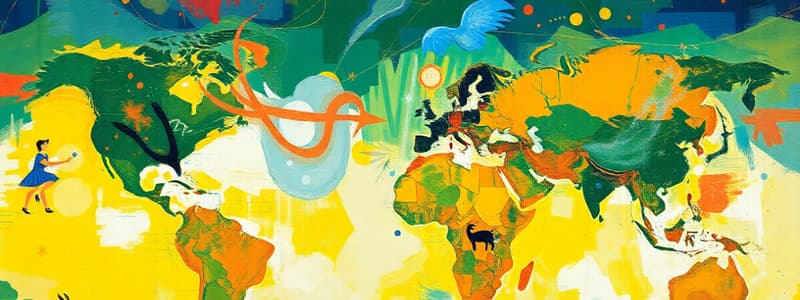Podcast
Questions and Answers
Which of the following is NOT one of the apocalyptic forces mentioned?
Which of the following is NOT one of the apocalyptic forces mentioned?
- Global warming (correct)
- Climate change
- Species extinction
- Peak oil
What has altered the balance between species extinction and new species incubation rates?
What has altered the balance between species extinction and new species incubation rates?
Human activities that exploit and plunder the biosphere.
Match the following elements to their descriptions:
Match the following elements to their descriptions:
Peak oil = Decline in U.S. oil production predicted in the mid-1970s Climate change = Increasing global temperatures impacting weather patterns Species extinction = Loss of biodiversity due to human actions Population overshoot = Exceeding the Earth's capacity to sustain life
What is the main consequence of political gridlock and corporate growth imperatives?
What is the main consequence of political gridlock and corporate growth imperatives?
What does the author suggest is a significant aspect of human existence?
What does the author suggest is a significant aspect of human existence?
Our societal structure can adequately support over 300 million individuals.
Our societal structure can adequately support over 300 million individuals.
What term do anthropologists use to describe the limit of complex relationships that humans can manage?
What term do anthropologists use to describe the limit of complex relationships that humans can manage?
What does the commentator suggest about the construction of society in relation to technocracy?
What does the commentator suggest about the construction of society in relation to technocracy?
The ruling class is portrayed as separated from the consequences of their decisions.
The ruling class is portrayed as separated from the consequences of their decisions.
According to the passage, what is a fundamental question being posed about humanity?
According to the passage, what is a fundamental question being posed about humanity?
The increasing population is anticipated to reach ______ billion or more.
The increasing population is anticipated to reach ______ billion or more.
Match the terms to their definitions:
Match the terms to their definitions:
What concept does the author associate with the inevitable consequences of expansionist civilization?
What concept does the author associate with the inevitable consequences of expansionist civilization?
The author believes that humanity’s existing social structures will adapt to ecological limits without significant changes.
The author believes that humanity’s existing social structures will adapt to ecological limits without significant changes.
Human communication is described as being __________ within a larger cosmic conversation.
Human communication is described as being __________ within a larger cosmic conversation.
What does the author suggest about humanity's awareness of ecological realities?
What does the author suggest about humanity's awareness of ecological realities?
Flashcards are hidden until you start studying
Study Notes
Apocalyptic Forces
- Peak oil, climate change, species extinction, and population overshoot pose as threats to the planet.
- M. King Hubbard predicted the decline of U.S. oil production in the mid-1970s.
- Tar sands extraction, though extending the peak, won't offset the effects of CO2 emissions.
- Political inaction, corporate growth, and consumer culture contribute to the looming crisis.
Interlocking Crises
- Species extinction rates outpace new species incubation, depleting biodiversity.
- Continuous population growth, particularly in the global south, exacerbates existing challenges.
- The ruling class, including governments and corporations, prioritize short-term gain over long-term sustainability.
- Nuclear winter and biotoxic horror are dangers exacerbated by technological advancements.
Human Condition and Communication
- The text challenges the meaning of "communication" in the face of ecological crisis.
- It emphasizes the interconnectedness of all life forms within the biosphere.
- The focus shifts from human-centric communication to the broader ecological context.
- The text questions the role of technology, highlighting the need for radical rethinking of our relationship with the environment.
Communication as a Grand Phenomenon
- Communication occurs at every level of the cosmos, from bacteria to quasars.
- Human communication, though narrow, participates in a vast and intricate web of information and energy exchanges.
- The text draws parallels between human communication forms, such as call and response in black churches and Inupiat throat singing, and the fundamental communication of life itself.
- Entrainment— the simultaneous occurrence of the call and response—is a key concept, challenging the traditional linear understanding of communication.
Human Limitations and Our Place in the World
- Our biological and social limitations hinder our ability to effectively address complex global challenges.
- The human capacity for empathy and self-regulation is eroded by social media and the pervasive influence of technology.
- The text critiques the "wet dream" of representative democracy and its emphasis on endless growth and consumption.
- The author argues for radical rethinking, questioning the “why” and “what” of our existence in light of the ecological crisis.
Studying That Suits You
Use AI to generate personalized quizzes and flashcards to suit your learning preferences.



